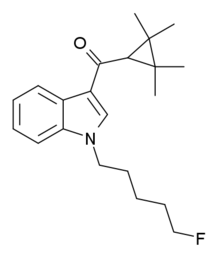XLR-11
XLR-11 | |
| 법적 상태 | |
|---|---|
| 법적 상태 | |
| 식별자 | |
| |
| CAS 번호 | |
| PubChem CID | |
| 켐스파이더 | |
| 유니 | |
| CompTox 대시보드 (EPA ) | |
| 화학 및 물리 데이터 | |
| 공식 | C21H28FNO |
| 몰 질량 | 329.459g/120−1 |
| 3D 모델(JSmol) | |
| |
| |
XLR-11(5-플루오로-UR-144 또는 5F-UR-144)은 EC 값이 각각 [1]98nM, 83nM인50 칸나비노이드 수용체1 CB 및2 CB에 대한 잠재적 작용제로 작용하는 약물이다.그것은 3-(tetramethylcyclopropylmethanoyl)indole 파생 상품 UR-144, A-796,260과 A-834,735 같은 화합물과 관련된지만 특히 이러한 다른 유사한 compounds,[2][3]과 함께 특허나 과학적인 문학에, 이전에는 애벗 래버러 토리스에 의해 만들어져를 하지 않은 것으로, p.의 주장 안에 떨어졌지만 나타나지 않아atentWO 2006/069196. XLR-11은 3mg/kg 및 10mg/kg 용량에서 랫드에서 신속하고 단명성 저체온 효과를 생성하는 것으로 확인되었으며, 이는 APICA [1]및 STS-135와 동등한 효력을 지닌다는 것을 시사한다.
검출
이 화합물에 대한 법의학적 표준을 이용할 수 있으며, 대표적인 질량 스펙트럼이 Forendex에 [4]게시되었다.
레크리에이션용
XLR-11은 대신 2012년 실험실들에 의해 합성 대마초 흡연 혼합물의 성분으로 처음 확인되었으며 그레이마켓 레크리에이션 [5]용도로 특별히 개발된 새로운 화합물로 보인다.
법적 상태
XLR-11은 뉴질랜드에서 [6]2012년 7월 13일부터 임시 등급 약물 스케줄에 추가됨으로써 금지되었다.
미국 DEA(Drug Enforcement Administration)는 합성 [7]카나비노이드 UR-144, XLR11 및 AKB48 부칙 I을 2013년 5월 16일부로 향후 2년간 규제물질법(CSA)에 의거한 불법 마약으로 만들었다.
플로리다에서도 [8]2012년 12월 11일부로 금지되었다.
애리조나는 2013년 4월 3일 XLR-11을 금지했다.[9]
2015년 10월 현재 XLR-11은 중국에서 [10]관리되고 있는 물질입니다.
XLR-11은 체코에서 [11]금지되어 있습니다.
부작용
XLR-11은 그 [12]사용으로 인해 입원과 연계되어 있다.
독성
XLR-11은 AM-2201과 [14][15]함께 일부 [13]사용자의 급성 신장 손상과 관련이 있습니다.
참고 항목
레퍼런스
- ^ a b Banister, S. D.; Stuart, J.; Kevin, R. C.; Edington, A.; Longworth, M.; Wilkinson, S. M.; Beinat, C.; Buchanan, A. S.; Hibbs, D. E.; Glass, M.; Connor, M.; McGregor, I. S.; Kassiou, M. (2015). "Effects of Bioisosteric Fluorine in Synthetic Cannabinoid Designer Drugs JWH-018, AM-2201, UR-144, XLR-11, PB-22, 5F-PB-22, APICA, and STS-135". ACS Chemical Neuroscience. 6 (8): 1445–1458. doi:10.1021/acschemneuro.5b00107. PMID 25921407.
- ^ WO 애플리케이션 2006069196, Pace JM, Tietje K, Dart MJ, Meyer MD, "카나비노이드 수용체 리간드로 3-Cycloalkylcarbonyl 인돌", 2006-06-29 발행, Abott 연구소에 할당
- ^ Frost JM, Dart MJ, Tietje KR, Garrison TR, Grayson GK, Daza AV, El-Kouhen OF, Yao BB, Hsieh GC, Pai M, Zhu CZ, Chandran P, Meyer MD (January 2010). "Indol-3-ylcycloalkyl ketones: effects of N1 substituted indole side chain variations on CB(2) cannabinoid receptor activity". J. Med. Chem. 53 (1): 295–315. doi:10.1021/jm901214q. PMID 19921781.
- ^ "XLR-11". Structural, chemical, and analytical data on controlled substances. Southern Association of Forensic Scientists (SAFS).
- ^ Wilkinson, S. M.; Banister, S. D.; Kassiou, M. (2015). "Bioisosteric Fluorine in the Clandestine Design of Synthetic Cannabinoids". Australian Journal of Chemistry. 68: 4. doi:10.1071/CH14198.
- ^ "CB-13, MAM-2201, AKB48, and XLR11 are classified as temporary class drugs". Temporary Class Drug Notice. The Department of Internal Affairs: New Zealand Gazette. 5 July 2012.
- ^ "DEA Makes Three More "Fake Pot" Drugs Temporarily Illegal Today" (Press release). 16 June 2013.
- ^ "Attorney General Pam Bondi Outlaws Additional Synthetic Drugs" (Press release). State of Florida. 11 December 2012.
- ^ "Governor Jan Brewer Signs Legislation to Combat Production, Use of Dangerous Drugs" (PDF) (Press release). Office of the Governor, State of Arizona. Archived from the original (PDF) on 7 June 2013. Retrieved 27 August 2014.
- ^ "关于印发《非药用类麻醉药品和精神药品列管办法》的通知" (in Chinese). China Food and Drug Administration. 27 September 2015. Retrieved 1 October 2015.
- ^ "Látky, o které byl doplněn seznam č. 4 psychotropních látek (příloha č. 4 k nařízení vlády č. 463/2013 Sb.)" (PDF) (in Czech). Ministerstvo zdravotnictví.
- ^ Jordan Trecki; Roy R. Gerona; Michael D. Schwartz (July 2015). "Synthetic Cannabinoid–Related Illnesses and Deaths". New England Journal of Medicine. 373 (2): 103–107. doi:10.1056/NEJMp1505328. PMID 26154784.
- ^ "Alphabet Soup, or the newer synthetic cannabinoids..." The Dose Makes The Poison Blog. 11 December 2013. Retrieved 18 September 2014.
- ^ Bhanushali GK, Jain G, Fatima H, Leisch LJ, Thornley-Brown D (April 2013). "AKI associated with synthetic cannabinoids: a case series". Clin J Am Soc Nephrol. 8 (4): 523–6. doi:10.2215/CJN.05690612. PMC 3613952. PMID 23243266.
- ^ "Acute Kidney Injury Associated with Synthetic Cannabinoid Use – Multiple States, 2012". Morbidity and Mortality Weekly Report. U.S. Centers for Disease Control and Prevention (CDC). 15 February 2013. Retrieved 15 February 2013.


